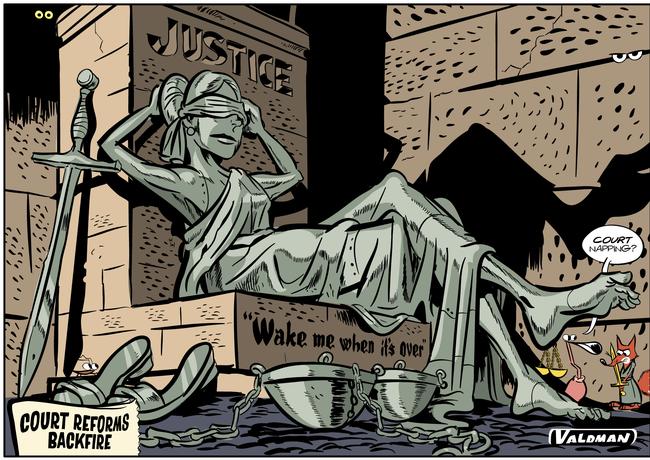South Australian court efficiency measures making our system run slower than ever before
Just 13 criminal cases have been sent to trial in the first 10 months of the controversial courts efficiency reforms — it compares with more than 400 prior to their introduction — but the backlog won’t sway Attorney-General to expedite her review.
SA News
Don't miss out on the headlines from SA News. Followed categories will be added to My News.
- EDITORIAL: Verdict has fallen on court efficiency
- Justice ‘delayed and denied’: Critics slam court efficiency reforms
- ‘Broken system’: Delayed cases will be thrown out, warn magistrates
- ‘I’m done’: Police prosecutor, magistrate, clash over efficiency
- ‘Bullying culture’: Prosecutors consider complaint over ‘disrespect’
Just 13 criminal cases have been sent to trial in the first 10 months of the controversial courts efficiency reforms – compared with more than 400, over the same period, prior to their introduction.
The Advertiser can reveal two more cases made it from the Magistrates Court to the District Court, only for state prosecutors to immediately drop all charges.
Lawyers have dubbed the logjam outrageous, saying they fear up to 300 more cases are “spinning their wheels” while prosecutors and SA Police bicker over evidence.
Craig Caldicott, co-chair of the Law Society of SA’s Criminal Law Committee, said the delays were disastrous.
“As long as these matters are stuck in court, it’s not good for victims of crime and it’s not good for defendants,” he said.
“And if magistrates keep throwing out delayed matters, then people are in effect getting away with alleged crimes.”
Commissioner for Victims’ Rights Bronwyn Killmier said the reforms were intended to reduce anxiety for victims.
“Long delays could result in victims withdrawing from the process, forgetting details and increasing their anxiety from not being appraised or consulted,” she said.
“In the worst case scenario, victim may not receive justice while an alleged offender remains in the community waiting to go to court – this may be a public safety issue.”
In March, the efficiency reforms, authored by former Attorney-General John Rau SC, changed the way cases move through the Magistrates Court.
The reforms were designed to streamline its workload while easing the District Court’s trial backlog.

Under the system, police retain control of cases until the Office of the Director of Public Prosecutions deems the evidence acceptable and takes over the matter.
The ODPP can – and repeatedly has – sent cases back to police, seeking further evidence, before determining whether they will continue, be downgraded or be dropped.
In the first week of the reforms, a rape case was adjourned for 14 months and a drug case for 18 months.
Since then, magistrates have warned they would throw out cases if delays continued, sparking angry exchanges with police prosecutors.
Figures sourced by the Criminal Law Committee show that, since March, 15 cases have been remanded to the District Court.
Two cases were then dropped by the ODPP.

Mr Caldicott said that was clearly a drop in efficiency compared with the old system.
“You could expect between 400 and 500 matters to go to the District Court, over 10 months, under the old system so we are down a lot of cases,” he said.
“We’re still where we were under the old system – the backlog has just shifted.”
He said the District Court’s caseload would only be reduced temporarily.
“There are three extra courtrooms being built there but, at this rate, they’ll be empty for months,” he said.
“We believe there are about 300 more cases in the Magistrates Court spinning their wheels, waiting for evidence.
“Eventually, all of those will flood the District Court and wash away any progress its made on its backlog.”
Ms Killmier said the delays reduced a victim’s ability to recover from crime.
“I am concerned victims are not being heard and the principles governing their treatment are not always being managed during these delay,” she said.
Attorney-General Vickie Chapman said she would take the figures “on board”.
“It’s important to note this legislation has not even been in operation for 12 months … data collected to this point can be skewed because of that, she said.”
“In March, I will conduct a review based on a collection of data which is being gathered right now.
“This data will be based on all parts of the reform, using a vast range of indicators and measures.”
SO WHAT ARE THE CHANGES?
PREVIOUS SYSTEM
■ Suspect arrested by police, DPP takes over the file.
■ Alleged offender remanded, in custody or on bail, for 10 weeks while police gather evidence for DPP’s consideration.
■ Case returns to court for that evidence, called “declarations”, to be provided to defence counsel, and for magistrates and victims to be updated on its progress.
■ Case adjourned to a further declarations date, if evidence is outstanding, or for an alleged offender to answer the charge.
■ Often, multiple further declarations dates are needed.
■ Magistrates have power to expedite cases or require DPP to file written outlines, while defence can seek to have evidence excluded or lagging cases thrown out.
■ Accused returns to court is remanded to the District Court for trial.
CURRENT SYSTEM
■ Suspect arrested by police, who retain conduct of the file.
■ Police tell the court how long it will take to compile a “preliminary brief” of all evidence in the case.
■ Alleged offender is remanded, on bail or in custody, until that date – or one sooner, chosen by magistrate.
■ Adjourned case remains the responsibility of police until the preliminary brief is complete.
■ DPP can send the preliminary brief file back to police multiple times if they do not consider it complete.
■ Case returns to court, DPP takes control and provides further declarations to defence counsel over subsequent hearings.
■ Alleged offender enters plea and is remanded to face the District Court for trial.
■ DPP has a further six weeks to file a “case statement” with the higher court, and defence has four weeks to respond.



